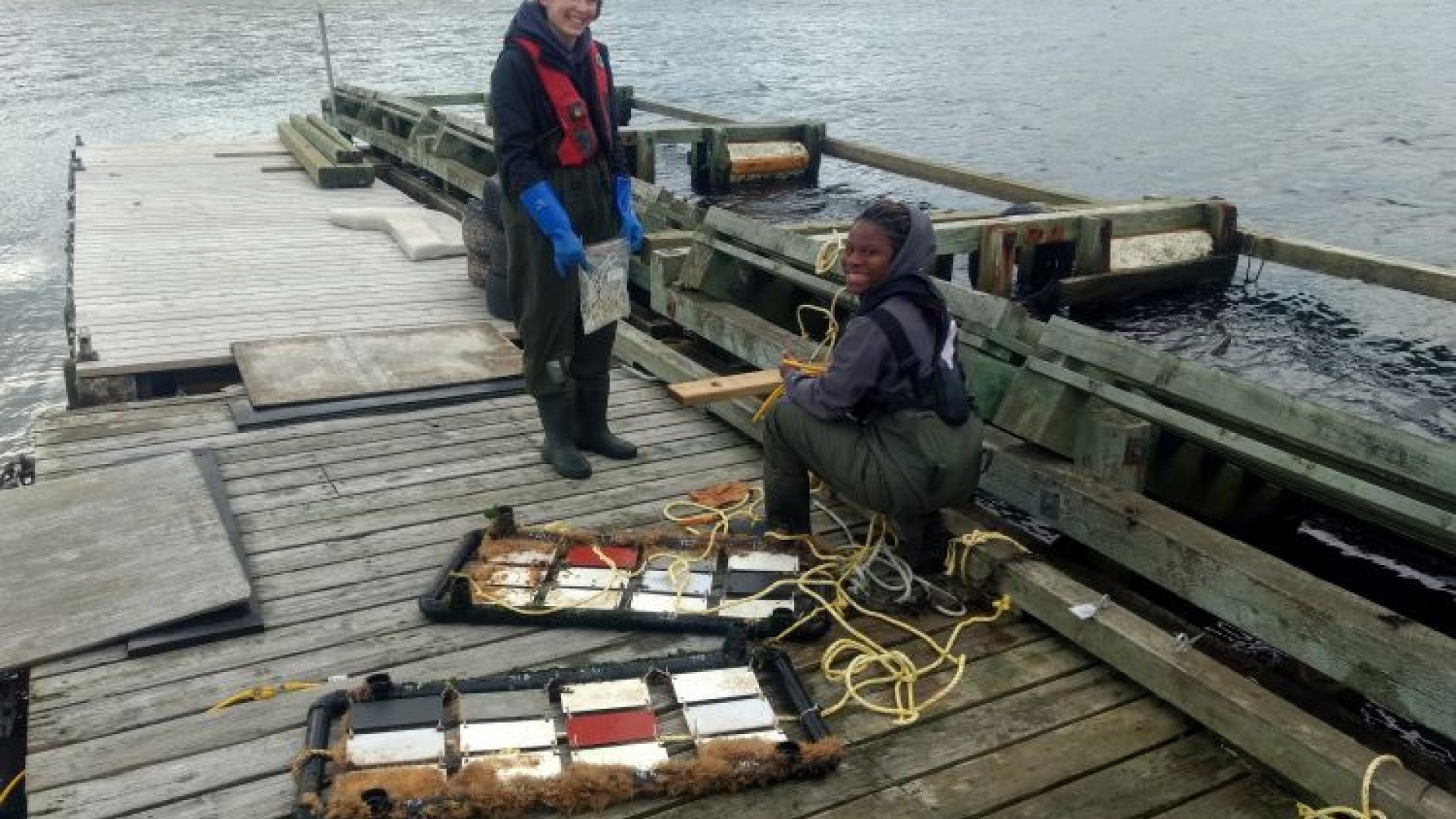
StFX faculty and students have been enjoying tremendous success over the past two years in receiving funding awards from Mitacs, a national non-profit organization that facilitates internship placements for students with eligible host organizations.
Since Mitacs expanded the eligibility of its program in late 2020 to allow undergraduates as interns, StFX researchers have increasingly accessed the program to support applied research activities. Since November 2020, StFX has had 19 approved projects, for a value of $383,333. This builds on seven prior projects from 2012 to November 2020.
“It has been wonderful to see so many StFX faculty researchers and students engaged in various Mitacs funded projects over the past several years,” says Dr. Richard Isnor, Associate Vice-President, Research and Graduate Studies. “These are excellent research projects that involve collaboration with businesses, Indigenous and community organizations and government. They also create entrepreneurial opportunities for our students. The diverse Mitacs programs have expanded student research-oriented experiential opportunities considerably at StFX.”
David Bruce, Director, StFX Research Grants Office, says this has opened new avenues for StFX undergraduates to obtain research experience, skills, and contacts with private companies, non-profits, and others that will serve them well after graduation. He says it has also provided more opportunities for faculty to expand the range of their research programs to include applied research projects.
It’s also meant that StFX researchers and their students are helping address research and other needs of private companies and non-profits, which means these organizations are becoming more profitable and/or able to improve the services they offer.
Each internship is worth $15,000, with MITACS and the host cost-sharing. Most or all is provided to the student as a stipend (minimum $10,000), and the balance is used for direct research costs.
Mitacs supports internship placements for undergraduates, masters, PhD, and post-docs across all academic disciplines. Students receive a four to six month internship placement, which the StFX faculty member co-supervises with a host organization representative.
Examples of Projects
Project: Testing Antifouling Performance of Graphene-based Coatings
The Wyeth Lab, led by Dr. Russell Wyeth, Biology, with student interns, recent BSc biology graduate Ally Hunter; Kylie Curnew, second year BASc Health student; and Kristyn Boutilier, fourth year BSc Biology student.
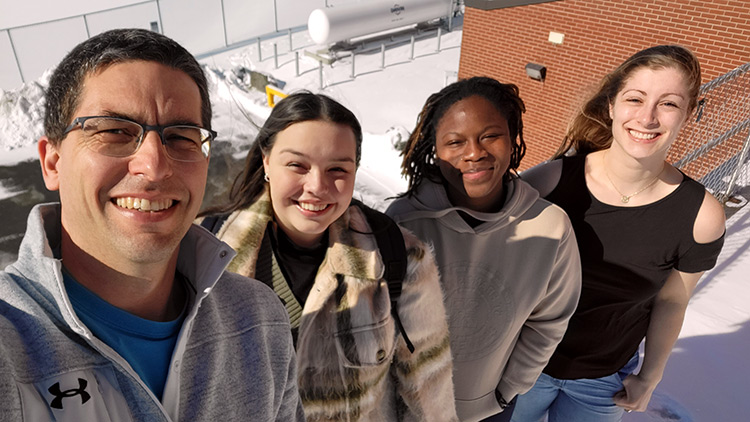
Q. Could you tell me briefly about your research project?
A. Ally Hunter and Dr. Russell Wyeth
Our research project tests the efficacy of graphene antifouling treatments engineered by our industry partner, Graphite innovation technologies (GIT). GIT is a Nova Scotian company developing non-toxic coatings that reduce the costs of dealing with the organisms that grow on boat hulls and other marine infrastructure. For our project, GIT coats steel plates with their graphene formulations and sends us these plates to test in local waters. Our experiment also incorporates control plates without coatings (made from acrylic or polyvinyl chloride (PVC)) as well as commercially available coatings as performance comparisons. We position the plates inside frames that allow us to hang them beneath floating docks. While the plates are in the water, we take weekly photos to document the growth of the different organisms that adhere to the plates. We can then compare how the fouling develops on the various different coatings to determine which have the best antifouling performance.
Q. Are there outcomes/discoveries to highlight from the work?
A. Ally Hunter and Dr. Russell Wyeth
Our results have helped identify several different formulations that appear to have better performance, as well as others that perform less well. Both are useful for GIT as they continue their coating development process. We have also included some initial testing of how the level of water flow passing over the coatings (which is important in the context of coatings intended for boat hulls) can complicate the comparison of coatings.
Q. Could you speak about new avenues this work/opportunity has opened?
A. Kylie Curnew
My internship with the Wyeth Lab and GIT through Mitacs has opened many new avenues for me. The internship allowed me to gain research experience in a different field. This has been helpful as it’s made me aware of other career options and it’s made me realize that I want to pursue research in the future. My internship helped my gain new skills, new scientific knowledge, and confidence in myself. The experience and skills I have gained throughout this internship have been very beneficial to me and my future career.
Q. What impact/significance has the internship placement had for you?
A. Kristyn Boutilier
My internship placement with the Wyeth Lab on the GIT project was an amazing learning opportunity. I was able to help test technology that will benefit both people and the environment. The experience of working in a professional research setting has been very impactful to my future career goals and reinforced my desire to pursue environmental research after graduation. Working on the GIT project with the Wyeth Lab has helped me gain confidence in myself and my abilities, both in the laboratory and out in the field.
Q. Could you talk about the significance of these internship placements?
A. Dr. Russell Wyeth
The biggest benefit of the Mitacs project for GIT is expanding the scope of the testing incorporated in the R&D. We can provide a scientifically rigorous experiment that provides an independent source of information alongside their in-house testing efforts. This helps them focus more on the technical development aspects—which is where their expertise is best applied. In addition, since biofouling organisms vary from location to location, it also is important to test coatings in more than one place – something that happens with our projects since we work at different field sites than our partner.
Project: Employment Transitions of Refugees: Refugees, Employer, and Sponsorship Group Perspectives in Pictou County
Dr. Norine Verberg, Department of Sociology, and recent graduate Kenzie MacNeil, who graduated in 2019 with a Bachelor of Arts degree in sociology and history and again in December 2021 with a Bachelor of Education degree
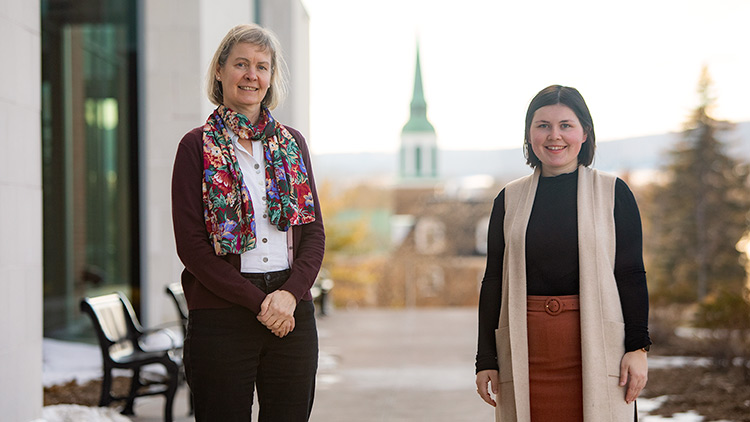
Q. Could you tell me briefly about your research project?
A. Dr. Norine Verberg
My research study focused on the employment transitions of refugees resettled in rural areas of Nova Scotia with the help of the sponsorship group.
Q. Are there outcomes/discoveries to highlight from the work?
A. Dr. Norine Verberg
I would highlight two key findings. First, because rural refugee newcomers are sponsored by groups that commit to providing resettlement assistance, we clearly find that sponsor group volunteers work very closely with newcomers to help them find work. This can include help with learning Canadian job search strategies, acquiring safety certification, and for many, learning how to have their employment credentials recognized in Canada. Second, learning English can be a significant barrier for unilingual newcomers. Access to English as an Additional Language courses in rural areas of Nova Scotia has improved, but they still fall short of meeting Canadian benchmarks. This poses additional strains to those who find they must get Canadian certification to work in their field, such as in plumbing or electronics.
Q. Could you speak about new avenues this has opened?
A. Kenzie MacNeil
This internship provided me with the opportunity to participate in each stage of research from working on interview scripts and conducting interviews through to presenting research findings at a conference. I believe that providing research internships that enable students to practically engage in what they learn about in class is a fantastic opportunity for undergraduate students because it provides students with an understanding of what’s possible with the degree they are pursuing and can provide clarity about their next step following their time at StFX.
Q. What impact/significance has the internship placement had?
A. Kenzie MacNeil
This internship had a significant impact on my academic experience at StFX. By focusing on the educational experiences of refugee newcomers resettling in rural Nova Scotia, I was able to combine two of my passions and utilize skills gained from my sociology degree as well as knowledge acquired as an education student to research this topic. The research experience has made me excited to pursue research opportunities in the future that bring together these two disciplines.
Q. Could you talk about the significance of these internship placements?
A. Dr. Norine Verberg
Mitacs interns provide valuable skills and resources. Kenzie enhanced her research skills through her diverse contributions to the study. In addition to contacting and interviewing research participants, Kenzie also conducted literature reviews and co-facilitates data analysis. Kenzie presented a paper at a Rural Economic Development conference in the fall term and she will present to the Canadian Sociological Association in June. In addition to co-authoring these presentations, we are writing a paper for publication. As well, Kenzie is developing resources for rural Refugee Sponsorship Groups to share with their volunteers and newcomers. Since some refugees must learn English after arriving to Canada, the resources Kenzie is developing are written in an accessible way. They are designed to provide newcomers with insights into what their first year of living in Canada will look like and the steps taken and resources used by newcomers to make a durable employment transition.
Projects: 1. Indigenous Front Line Workers: Mapping Future Directions in the Resolution Health Support Workers and Non-Insured Health Benefits Navigator Programs in Atlantic Canada: Dr. L. Jane McMillan, Anthropology, and fourth year health sciences student Emma Moss
2. Envisioning the New Mi’kmaw Friendship Centre through Participatory City and Principles of Reconciliation: Dr. L. Jane McMillan and third year anthropology/philosophy student Olivia Leroux
3. Livelihood Fisheries and Indigenous Rights in Atlantic Canada: An Examination of Netukulimk Principles in Action: Dr. L. Jane McMillan and third year psychology student Emily Mak
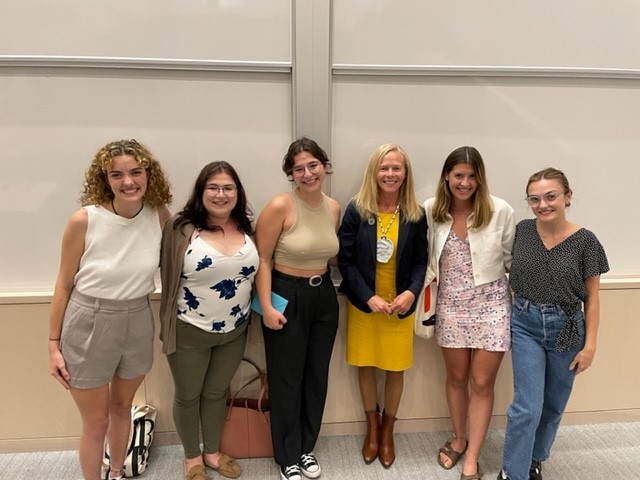
Q. Could you tell me briefly about your research project?
Emma Moss: My research project partnered with Atlantic Policy Congress of First Nations Chief Secretariate’s Health department. We investigated the major health concerns of First Nations in Atlantic Canada and subsequently identifying barriers to health and healing services that Indigenous People face.
Olivia Leroux: My research project looks at the Every One Every Day model piloted at the Mi’kmaq Native Friendship Centre in Kjipuktuk-Halifax and how effective it, and the cross-sector collaboration that fueled the pilot, could be as a reconciliatory model. For me, the goal was to see if this model would be practical and sustainable in the new Friendship Centre, also known as the Wije’winen – come with us project.
Emily Mak: I worked with the Atlantic Policy Congress First Nations Chief Secretariat (APC) in the Fisheries department. With (student intern) Sydney Chambers, I was introduced to the project, focused on the right to a moderate livelihood and Indigenous knowledge.
Q. Are there outcomes/discoveries to highlight?
Emma Moss: This project first demonstrated the resilience and strength of Indigenous Peoples specifically in Atlantic Canada. The findings then highlighted the need for culturally competent and culturally relevant care, especially among such an emotional time with the first unmarked grave revelations at former Residential Schools. The trauma among Indigenous peoples in Atlantic Canada is too large for the often-precarious services available. This project also highlighted the need for long-term preventative health services rather than reactive interventions from the perspectives of front-line workers.
Olivia Leroux: In collaboration with partners across the city, the pilot was quite successful. My work reflects the importance of collaboration, openness, and holding space for Indigenous self-determination in reconciliation. This pilot really encourages the building of authentic relationships as well as learning, humility, and love within diverse communities.
Emily Mak: As the internship began the project was continuously growing and evolving, where it began with a scan for netukulimk in the Mi’kmaq livelihood fishery plans, it shifted for me to looking at the systemic racism perpetuated through non-Indigenous media resources.
Q. Could you speak about new avenues this has opened?
Emma Moss: I gained invaluable research experience from the grant writing process, Research Ethics Board applications, one-on-one interviews, transcriptions, and report writing. This experience will act as a foundation I can apply to further community-based Indigenous health research I pursue. This internship also allowed me exposure to daily tasks of multiple health professionals outside of medical care. It was also a major networking opportunity as I am now a member of the Labrador-Wabanaki Research mailing list, the Atlantic Indigenous Mentorship Network, and remain on the email list for upcoming training events and health conferences with the Atlantic Policy Congress of First Nations Chief Secretariate (APC). This internship also offered multiple training and education opportunities for me.
Olivia Leroux: This research experience has improved my quality of work and has pushed me to continue in academia. This has not only connected me to a fantastic community in Kjipuktuk-Halifax and at StFX but has shown me the value of research when it is community based and done with respect and care for the community I partner with.
Emily Mak: From this research I have been taught so much and only hope to help teach others as well. As a learning and growing ally, I instead see this as an opportunity to engage with and listen to the Mi’kmaq communities of Nova Scotia in educating myself and hopefully others.
Q. What impact/significance has the internship placement had?
Emma Moss: As an Indigenous scholar being placed with the APC allowed for substantial personal capacity building. I learned so much firsthand the work that needs to be done towards building optimal health for Indigenous Peoples in Atlantic Canada. This placement granted me such a positive teaching experience from other Indigenous Peoples from Nova Scotia, New Brunswick, and PEI even among hard times. I remain up to date on contemporary issues among First Nations Peoples in Atlantic Canada and the rest of Canada as a result of this placement. I also am continuing to work on my own cultural competency as it is a dynamic journey that requires continuous work. This placement and experience have helped my confidence in my own identity and has facilitated my new position as the youth representative with Empowering Indigenous Women for Stronger Communities in Newfoundland and Labrador.
Olivia Leroux: The internship has brought to light a lot of my skills, but also a lot of my weaknesses. It was a great opportunity to learn and grow with a research partner and a really great team at the Mi’kmaq Native Friendship Centre. The internship really showed me how anthropology can play a role in social justice and taught me a lot about the importance of collaboration when tackling big questions like how to advance reconciliation.
Emily Mak: I could not have lucked out more than to work with and learn from all the people I collaborated with this summer. This opportunity allowed me to learn not only professional research skills but also so much valuable information on Indigenous peoples in Canada that will only continue to help decolonize myself.
Q. Could you talk about the significance of these internship placements?
Emma Moss: These internship placements are significant for private companies and non-profits research needs as when given the opportunity students can provide a new and different perspective to a project. Research is fluid and demanding financially and with regards to time; the internships funded by Mitacs for students to conduct research with these organizations have the capacity to contribute to significant findings, recommendations, and innovations while the organization focuses on their main projects.
Olivia Leroux: Community based work is so important and being an intern in a researching role really highlights the practicality of academia. By taking the skills that you learn within your program, honing in on them, then using them to help someone, it feels purposeful. The relationships and connections built with those you collaborate are so unique and it becomes a learning experience for both parties. As an intern, you can support a company or non-profit organization in a way that highlights the fantastic work that they’re doing and can identify ways that can make it more diverse, inclusive, and sustainable.
Emily Mak: After this experience I know that it is vital that I continue having these conversations of reconciliation with anyone willing to listen. I even experienced this multiple times this summer while being out at social events and these topics came up, I was able to educate others and point them in the direction of great sources. While this summer has now come to a close, I know my pursuit of education and reconciliation has only just begun.

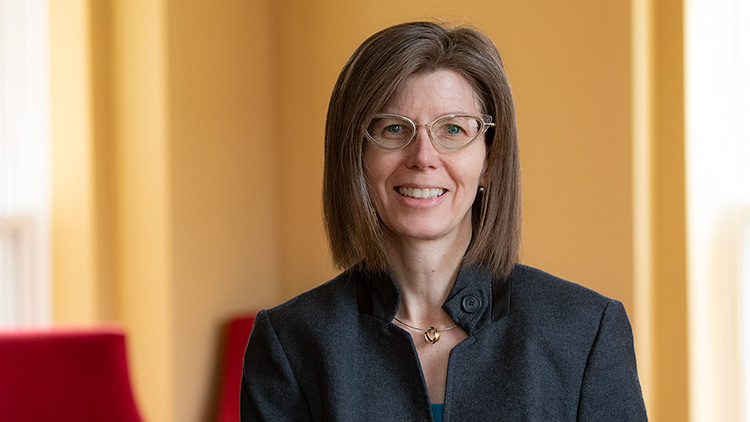
Project: Efficacy of online games for ocean career education
Dr. Katarin MacLeod, Faculty of Education, and student intern, Gwendolyn Griffiths
Q. Could you briefly describe your research project?
A. In this research, we investigated the use of three specific online games to teach ocean literacy within the province of Nova Scotia. Pre-service teachers from StFX were introduced to the games prior to beginning their practice teaching. They incorporated the games during their practicum and were interviewed as a follow-up to identify how using the games impacted student learning and engagement.
Q. Are there outcomes or discoveries to highlight?
A. Pre-service teachers reported Salmon Cycle, an interactive game based on Atlantic Salmon life cycle and Mi'kmaq culture, to be effective in engaging and educating students in several key areas. An important aspect of the Salmon Cycle game was that it was both culturally and geographically relevant to the Maritimes. Based on the results from this study, resources like the Salmon Cycle game can help teachers integrate ocean literacy into their pedagogy by connecting the interactive game content with science, technology, society, and environmental outcomes (STSE) as well as increasing students’ digital fluency.
Q. Could you speak about new avenues this has opened?
A. This was an excellent opportunity for my B.Ed. students to obtain research experience and skills in the broad area of science education research and specifically in the areas of ocean literacy, gaming, educational methodologies, and the associated literatures. A key component was learning to think critically about the pedagogical implications of selecting and incorporating technological learning tools like interactive games.
Q. What impact/significance has the internship placement had?
A. I have had the opportunity to partner with an outstanding private company as part of the Mitacs funding arrangement, First Mobile Education (Stellar RHL). It was an opportunity to gain more insight into the field of educational apps and understand more about the benefits and challenges of a private–academic partnership.
Q. Could you talk about the significance of these internship placements?
A. This has been significant in three ways: (a) Access: The pre-service students learned new skills which they otherwise would not have had the opportunity to have learned during their degree without incurring an additional financial burden. School students had the opportunity to use these games as part of their curricular content and be empowered to provide feedback on their own experiences with technology and the relevance of online games for learning. (b) Real-World Application Testing Grounded in Research Methods: Stellar RHL had the opportunity to partner with StFX and because of this, now has feedback from real-world applications of their products; moreover, as a research project, the findings will be presented and published, thus increasing knowledge in the academic and industry communities. As a research project, the student involved gained valuable experience in how to implement a research project. (c) Future Opportunities: This internship has led to further conversation between Dr. MacLeod and First Mobile Education on ways to continue and further this research initiative, exploring expanded ways to integrate appropriate technological tools into school curriculum and enhance pre-service teacher education.
This research is, in part, made possible by the Government of Canada Research Support Fund.

